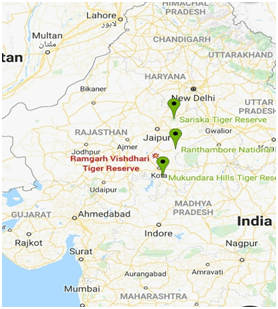Ramgarh Wildlife Sanctuary set to be notified as 4th tiger reserve
Ramgarh Vishdhari Wildlife Sanctuary, which is among the proposed five sites in the country, is expected to be formally notified as tiger reserve (TR).
Context
Ramgarh Vishdhari Wildlife Sanctuary, which is among the proposed five sites in the country, is expected to be formally notified as tiger reserve (TR).
About Ramgarh Vishdhari wildlife sanctuary
- Ramgarh Vishdhari wildlife sanctuary is located in Bundi district of Rajasthan.
- It was notified as a wildlife sanctuary in 1982.
- The area comprising two forest blocks of Bhilwara and territorial forest blocks of Bundi and Indargarh has been identified as a Tiger Reserve.
- Ramgarh sanctuary falls under the buffer zone of Ranthambore Tiger Reserve (RTR).
- The core area of the Ramgarh Vishdhari wildlife sanctuary has eight villages.
- It consists of Dhok, Khair, Salar, Khirni trees with some Mango and Ber trees.
- It consists of birds and animals like Leopard, Sambhar, Wild boar, Chinkara, Sloth bear, Indian Wolf, Hyena, Jackal, Fox, deer and Crocodile.

Other Tiger Reserves in Rajasthan
- Currently, Rajasthan has three tiger reserves namely-
- Ranthambore Tiger Reserve(RTR) in Sawai Madhopur
- Sariska Tiger Reserve(STR) in Alwar
- Mukundra Hills Tiger Reserve(MHTR) in Kota
About Project Tiger
- It was launched in 1973 with 9 tiger reserves for conserving our national animal, the tiger.
- It is an ongoing Centrally Sponsored Scheme of the Ministry of Environment, Forests and Climate Change.
- Currently, the Project Tiger coverage has increased to 51 Tiger reserves, spread out in 18 tiger range states which amounts to around 2.21% of the geographical area of our country.
- The tiger reserves are constituted on a core/buffer strategy.
- The core areas have the legal status of a national park or a sanctuary, whereas the buffer or peripheral areas are a mix of forest and non-forest land, managed as a multiple use area.
- The NTCA was launched in 2005, following the recommendations of the Tiger Task Force.
- It's a statutory body of the Ministry, with an overarching supervisory/coordination role, performing functions as provided in the Wildlife (Protection) Act, 1972.
- M-STrIPES (Monitoring System for Tigers - Intensive Protection and Ecological Status) is an app based monitoring system, launched across Indian tiger reserves by the NTCA in 2010.
Protection Status of Tiger
- Indian Wildlife (Protection) Act, 1972: Schedule I
- International Union for Conservation of Nature (IUCN) Red List: Endangered.
- Convention on International Trade in Endangered Species of Wild Fauna and Flora (CITES): Appendix I.

